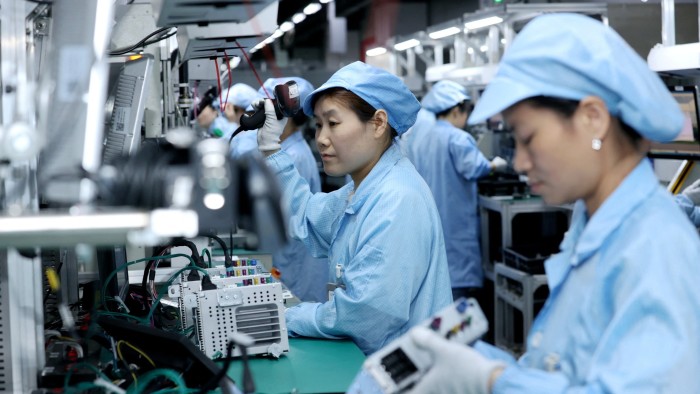Unlock the Editor’s Digest for free
Roula Khalaf, Editor of the FT, selects her favourite stories in this weekly newsletter.
China said it would increase its retaliatory tariffs on US goods to 125 per cent, in the latest escalation of the trade war between the world’s two biggest economies.
China’s finance ministry said the increase from current additional levels of 84 per cent would take effect from April 12.
But the ministry added that it would ignore any further US tariff rises on Chinese exports, “given that at the current tariff level, there is no market acceptance for US goods exported to China”.
“The US’s imposition of abnormally high tariffs on China seriously violates international economic and trade rules, basic economic laws and common sense, and is completely unilateral bullying and coercion,” it said.
The move is the latest in a week-long tit-for-tat between the two countries in which US President Donald Trump’s administration has attempted to isolate China after pausing some tariffs on other trading partners.
It comes alongside a mounting wave of shipping disruption that threatens to break down international trade between the countries, with cancellations of shipments set to disrupt transpacific voyages.
According to the state news agency Xinhua, Chinese President Xi Jinping said on Friday that “there are no winners in a tariff war” and “confronting the world will only lead to self-isolation”.
Recommended
The world was “undergoing accelerated changes unseen in a century, with overlapping risks and challenges”, Xi said.
The chaotic rollout of Trump’s aggressive tariff agenda has convulsed markets since his “liberation day” announcement on April 2, wiping trillions of dollars from global stock indices and sending bond yields soaring.
On Friday, the dollar slumped to a three-year low against the euro, which rose as much as 2.4 per cent against the US currency to $1.147, its highest level since February 2022, before paring some of its gains.
Earlier this week, Trump introduced a 90-day pause for dozens of countries from his so-called reciprocal levies announced at that time, prompting a recovery in market prices. China was excluded from the reprieve.
Trump last week introduced additional tariffs on China of 34 per cent, which added to two previous increases of 10 per cent. He has since repeatedly increased duties after retaliation from Beijing.
Trump’s latest escalation this week has raised US duties on Chinese imports as high as 145 per cent.
China’s average tariff on US imports now stands at 147.6 per cent, according to Chad Bown, senior fellow at the Peterson Institute.
Recommended
Some of China’s largest companies have begun rolling out measures to soften the impact of the US tariffs.
Ecommerce group JD.com on Friday unveiled a Rmb200bn ($27bn) initiative to help suffering exporters, saying it would buy made-for-export goods to resell in China’s domestic market.
The retailer added that Chinese companies that had been “going global” for years faced “challenges when shifting from exports to domestic sales, such as unfamiliarity with the local market and a lack of operational experience”.
The supermarket unit of internet giant Alibaba also said it would work with exporters to expand their domestic sales.
Additional reporting by Gloria Li in Hong Kong




